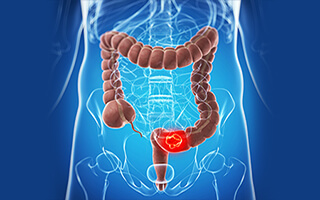
Colon cancer is one of the leading causes of cancer deaths worldwide. That's partly because it's very hard to cure if you don't catch it early. Unfortunately, it's difficult to catch it early. By the time you have symptoms, it's usually at stage 3 or stage 4. And colon cancer this advanced is notoriously resistant to treatment.
Even if your cancer goes into remission, it will usually come roaring back with little response to treatment. So prevention is vital. If you've had colon cancer and you're in remission, prevention becomes even more crucial. Fortunately, a recent study found that a common nutrient can help prevent colon cancer and colon cancer recurrence.
When a colon-cancer patient goes into remission, the chemotherapy has killed off the cancer cells. But the chemotherapy doesn't destroy the genetic mutations that caused the cancer in the first place. These can survive in the colon, but only in a specific group of cells. These are actually stem cells. Stem cells, as you may know, are premature cells that haven't grown into mature colon cells. As these stem cells mature with the cancerous mutations, the tumor can reappear and cause a relapse.
Joerg Huelsken and his team at Ecole Polytechnique Fédérale de Lausanne in Switzerland wanted to see if they could figure out how to stop these stem cells from turning into cancer. They focused on a protein called HOXA5. This protein regulates the body's stem cells. It helps them mature into the proper tissue.
Continued Below...
Insulin’s Evil Twin
This overlooked hormone might be the real reason you still struggle with out-of-control blood sugar. But most doctors (even alternative doctors) ignore it completely.
Click Here To Learn More
Using different techniques, the team looked at cells, mouse models, and samples from human patients. They found that the cancerous mutation in the stem cells blocks HOXA5, which causes the stem cell to lose its direction. Once its pathway is disrupted, the mutation causes the cell to mature abnormally. And the cancer returns with a vengeance.
But the researchers didn't stop there. They also wanted to find out if they could reverse the blocking of HOXA5. The answer came from a very common nutrient: vitamin A. Previous research had proven that vitamin A's retinoid chemical structure induces the differentiation of stem cells in the skin. And these researchers found that the retinoid can re-activate HOXA5. In fact, when the researchers gave vitamin A to mice with colon cancer, it blocked tumor progression. And it normalized the tissue! That's amazing!
So the researchers turned their attention to people with colon cancer. They found the same results. When they turned the HOXA5 gene back on, it eliminated cancer stem cells and prevented metastasis.
The researchers said, “Retinoid differentiation therapy could be significantly effective against colon cancer, not only for treatment of existing disease but also as a preventive measure in high-risk patients.”
So if you're at high risk for colon cancer, or if you're in remission from colon cancer, vitamin A could be a vital part of preventing the disease. But don't stop with vitamin A. Taking 5 mg of folic acid along with 50,000 IU of vitamin A daily under your doctor's care can reverse degenerative cellular damage.
One caveat: Vitamin A can be toxic when taken in large doses. This is especially a concern for pregnant women and women during their reproductive years (who should avoid taking this large dose). Otherwise, it's not likely you'll experience toxicity with this dosage, but everyone's different. If you experience any signs of toxicity, including bleeding in the lungs, blurry vision, bone pain, breathing difficulty, changes in immune function, chronic inflammation of the liver, cirrhosis (scarring of liver), cough, cracked fingernails, cracked lips, decreased thyroid function, and others, talk to your doctor immediately.
If you do experience toxicity symptoms, simply take a warm bath and put 2 oz. of vitamin C crystals or powder in the water. It will help neutralize the overdose.
Your insider for better health,

Steve Kroening
Source:
http://www.sciencedaily.com/releases/2015/12/151214130400.htm